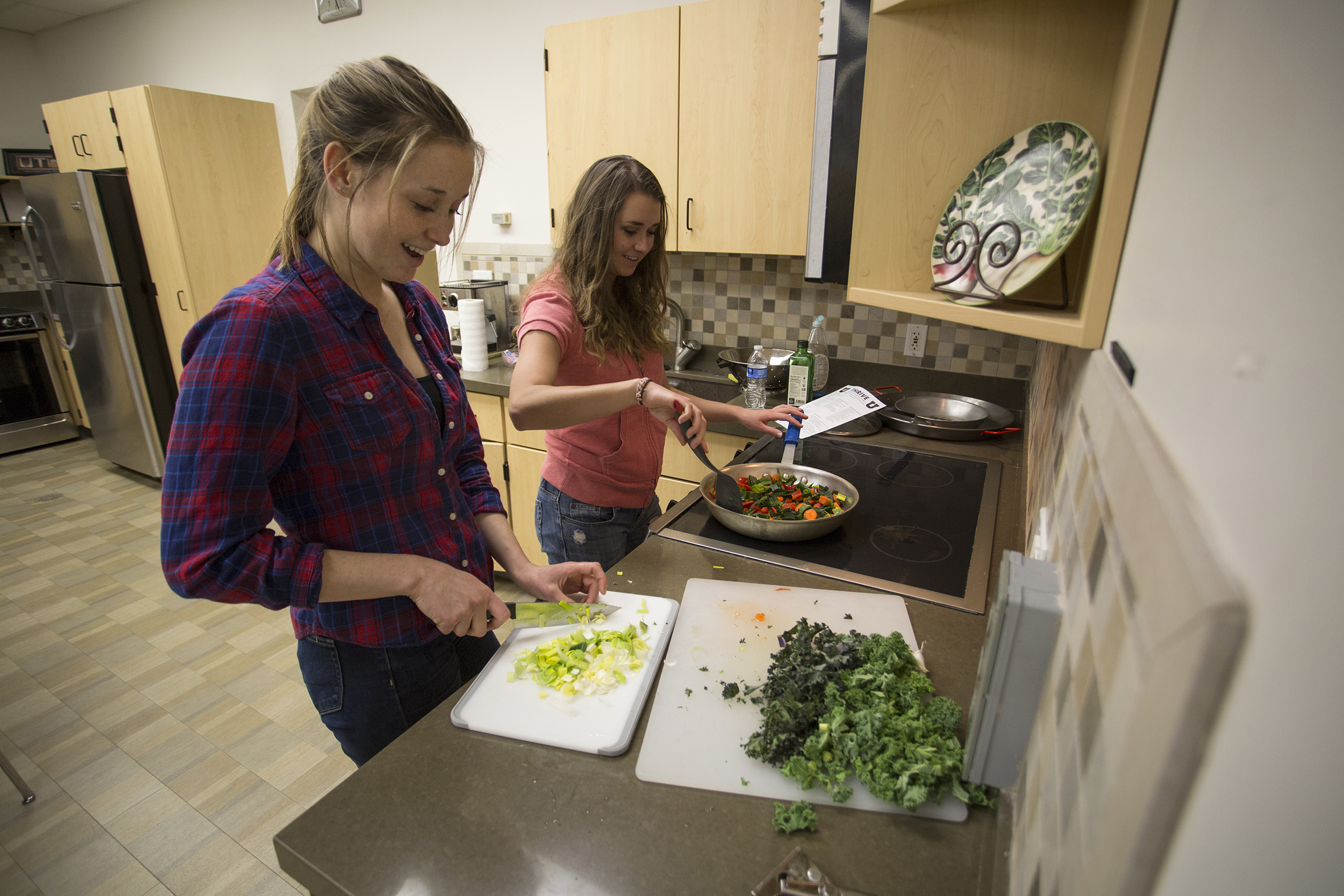
April 30, 2015—Pulling consecutive all-nighters, wearing the same sweatpants for three days, counting four cups of coffee as a meal–these habits are easy to fall into during college. Twelve University of Utah students in the “Redefining Health and Wellness” honors Praxis Lab are hoping to change that by creating a cooking and wellness course to be offered to all university students starting in fall 2015. The course, titled “Thrive,” will teach students how to create fast, inexpensive and healthy meals, and each will be paired with lessons on the different dimensions of health.
Each year, the U’s Honors College offers three Praxis Labs. These labs are year-long, project-based courses that combine theory with action and exist to engage students with the community.
In “Redefining Health and Wellness,” students explored the seven dimensions of health: social, emotional spiritual, environmental, occupational, intellectual, physical and sexual.
Throughout the 2014-2015 academic year, students delved into literature on each of these dimensions, as well as heard from guest speakers representing each dimension, including a tai chi master, legislators, a chaplain and a physician.
At the start of the course’s second semester, students pitched a number of project ideas in which they could apply concepts learned during the first semester. Though many ideas such as campus gardening and an app to keep track of available gym equipment at the U’s Student Life Center were pitched, the class ultimately decided on creating a cooking class which would engage students in the seven dimensions of health.
The course will be offered starting fall 2015 semester as an optional three-hour lab for Nutrition 1020: Scientific Foundations of Nutrition and Health. The lab will use cooking as a method to help students explore the multiples facets of wellness and create a cohesive vision that students can apply long after they graduate.
For example, one week’s lesson on sexual health will discuss commonalities between effective communication in the kitchen and effective communication in a relationship. In this lesson, students will cook arugula salad with halibut and Italian spaghetti squash, something the Praxis Lab deemed as a good recipe to try on a date night.
According to the mission statement the class created for Thrive, Praxis Lab members recognized a desperate need among their peers: “Many college students completely disregard their overall wellness; they pull all-nighters, cram for exams, and trust in the invincibility of youth.”
Because most students think that being healthy is simply requires going to the gym and eating less Top Ramen, the Praxis Lab hopes that Thrive will “break down the barriers that are holding students back from becoming functional, vibrant individuals.”
To test Thrive before full implementation in the fall, Praxis Lab members piloted the curriculum twice a week throughout the month of April. Each pilot lesson attracted anywhere from five-15 participants, who completed surveys about expectations, ease of recipes, and impression of the course before and after each lesson.
Unique for their small class sizes and unorthodox curriculum, Praxis Labs not only provide students with the opportunity to apply concepts and skills learned to engage and improve the community, but also help students develop much-needed workplace skills such as critical thinking, hands-on problem solving and project management.
Astin Goff, a sophomore majoring in nursing, said the Praxis Lab taught her how to work well in a group and juggle multiple, pressing responsibilities at the same time.
“In the real world, you’re seldom ever working by yourself. The Praxis Lab immersed me in intensive group work and taught me the art of being tactful, which are critical in the career I’m pursuing,” said Goff.
Alexis Lee, another Praxis Lab member, said the course pushed students to confront their own biases about the meaning of health.
“The beauty of a Praxis Lab is how multidisciplinary it is and how it allows everyone to pull from different skill sets in order to learn from each other,” said Lee.
“The greatest joy has been getting to see our project come to fruition. From the initial phase of brainstorming to creating the curriculum, we designed the course from scratch. Getting to see the impact in real time is the most fulfilling and rewarding feeling.”
To receive updates about Thrive, follow the course’s Facebook and Instagram accounts.
